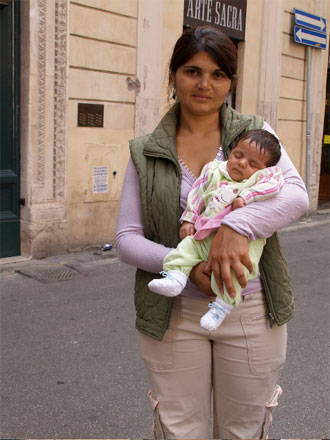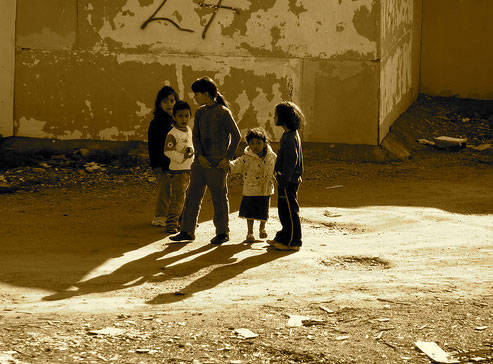Does Misery Love Company? Italy’s Roma
ROME – Misery may love company, but it is not a two-way street. Few are more miserable these days than the Roma, or Gypsies, in Italy, whose camps are being bulldozed by officials, whose shacks are being firebombed at night by self-styled vigilantes, and whose children now risk being fingerprinted.
The mayor of Rome, Gianni Alemanno, has an unsavory past of neo-Fascist youth stunts that twice brought him police trouble. Those of us who believe in second chances have been slow to attack him for the idiocies of teenagerdom: after all, Fabrizio Cicchitto was a Marxist-Leninist in his youth and then a member of the P2, and this has not stopped Premier Silvio Berlusconi from making Cicchitto his third-in-command, after Gianni Leta.
But now Alemanno proposes fingerprinting Roma children. The outcry has been so strong that the Prefect of the city of Rome, whose bailiwick includes the plight of the Roma, is cautiously backing off, saying that, well, the EU allows children over six to be legally fingerprinted. The problem here, of course, is that the EU directive would refer to all children, not to a specially selected group of undesirables.
Some 150,000 Roma live in Italy, and an estimated 15,000 in Rome alone. Some have lived in Italy for generations, and even a good many recent arrivals are fully legal. However, an unknown number—many flooding in from that recent arrival to the EU, Romania—live in perhaps twenty illegal camps in and around Rome, some totally without running water or electricity. For these there is no easy solution. Italy, like all traditional societies challenged by a massive arrival of immigrants from other cultures, is baffled.
Tullia Zevi, for fifteen years president of the Union of Italian Jewish Communities in Italy (UCEI), makes the point that, “A country’s minorities are a sort of thermometer indicating, from the way they live and their conditions, the degree of democracy in that country. I’ve always had a strong sense of solidarity with the Roma and their problems because their destiny has been similar to that of the Jews, and this is an injustice which is only rarely remembered.
“The current wave of anti-Roma feeling in Italy is a challenge that our times offer us, and which we have to face. In part we are doing this: we are becoming ever more European, more a part of the rest of the world, thanks to improved communications and shifts in population…. But we also see extreme right-wing racist ideologies rooted in a lack of culture and in frustrations.”
In Milan graffiti proclaimed, “Zero Roma Camps,” and in a dawn attack on a camp in the Bovisasca suburb police made a number of arrests. Roman Catholic Cardinal Dionigi Tettamanzi protested, saying that the Roma living in Bovisasca were being treated beneath the minimal level of respect for human dignity. “And just what kind of benefit do such methods achieve?” the Cardinal Archbishop of Milan said. “The dignity of individuals must always be respected.”
The problem is intractable, as anyone can see. At midday recently in Naples, that crime-ridden city drowning in its own rubbish, the thermometer stood at around 100 degrees inside the crammed car of the little Circonvesuviano train, when the strains of an accordion could be heard. A rough-looking teenage Rom walked down the aisle through the crowd of passengers and tunelessly played a song. Stumbling before him, struggling to stay upright as the train swayed, was a tow-headed, dirty-faced boy of perhaps five holding a can in front of him to collect coins. But no coins were proffered, and indeed no one paid the least attention either to sullen teenager or child, whose face was a mask of misery.
I was outraged. If the child had been Italian, I thought, people would have protested. Well, I would, and did. Seeking out the train conductor, I informed him as forcefully as possible that such exploitation of a child should not be allowed.
Giving me the briefest of glances, the conductor shrugged. “I’m not a policeman.” So much for my protest. Alert to my fussing and fuming, the Rom and his tiny ward had meantime slipped off the train at the next stop.
That was not the end of the story. At ten pm that same evening, seated over wine and pizza at a cheery outdoor restaurant at the lovely Piazza Dante of Naples, my heart sank when I heard music—that same music of so many hours before. The Rom teenager was back, and still circulating with the same Zombie-like child, staggering blankly from fatigue. I could think of nothing better than to write as withering a letter of protest as possible to the Naples daily, Il Mattino, for which I had occasionally written opinion pieces. My letter pleading for social welfare workers to help Roma children was duly published, and duly ignored—until one day when I was buying a ticket to enter a museum in Naples, the woman in the ticket booth said, “I know you.”
“What?”
“I was on the train that day—I saw the boy, and I saw you go for the conductor. Then I read your letter. But nothing happened.” She looked at me with, I thought, pity.
I was puzzled. This obviously rather kind Neapolitan woman had felt no need herself to take action of any kind, or to protest. But then, as I immediately realized, she knew, before I did, that protest was obviously futile. Her pity was as much for herself as for the suffering child, for she understood her own sense of powerlessness.
Others are reacting, however. At a school in Rome, where 22 elementary schoolchildren are in a class with several Roma children, the parents are fighting to protect the Roma students’ right to remain in the school despite blinkered bureaucrats who would send them away. Food, showers, laundry—the parents are doing all they can because, said one, “they are spitting on the Roma children, who are at risk.”
In Milan, where a priest managed to get a large group of children into a school, the teachers are refusing to put them all in the same classroom which would become a ghetto. For their pains the teachers are being accused of racism, but are not backing down.
And there are other bright spots. In a flash flood in a low-lying area outside Rome two weeks ago, a family trapped inside a car in which water was rising inside included a handicapped child unable to walk and an elderly man. Desperately knocking on the car windows, unable to open the doors, those trapped were ignored by passersby and even by Carabinieri, until an anonymous Roma man appeared, forced open the doors, and carried all to safety. Then the Roma slipped away.
Newspapers have appealed to know his identity, but to date he remains unknown, an authentic accidental hero.



































i-Italy
Facebook
Google+
This work may not be reproduced, in whole or in part, without prior written permission.
Questo lavoro non può essere riprodotto, in tutto o in parte, senza permesso scritto.